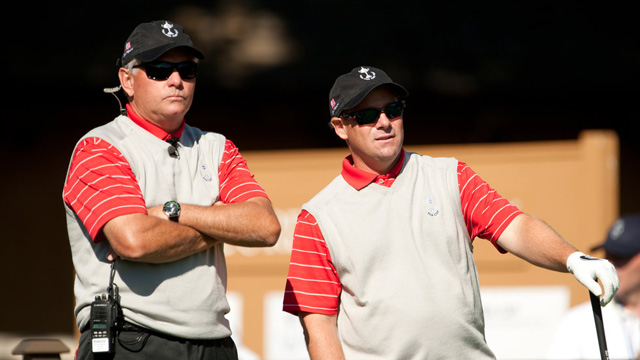NEWS
Three keys to success in team events

For those that are able to stay up and watch The Presidents Cup this week down in Australia, I'm sure you will be treated to some tremendous golf and intense action. Not only do you have many of the best players in the world, but the match play format that many fans only see occasionally, is ideal for providing great theater.
Some of the most enjoyable times I've had in golf have been centered on these team events. I've been privileged to have been a part of three Ryder Cups, I've attended the Presidents Cup and perhaps the highlight of my golf career was being able to captain the United States PGA Cup team to victory this past Fall at CordeValle against a wonderful team from Great Britain & Ireland.
Obviously, unlike stroke play, match play (and especially in these type events) bring in a couple of different formats and thus, some strategies that can provide enough edge to decide who wins or loses. I've always had three tenants of match play that I truly believe make a difference. So here are some items to look for as you view the matches from Down Under.
1.) Partner chemistry: I am confident that both respective captains understand how important this is. Obviously, as you make your pairings, you want players who complement each other in skill sets. But I really believe that it's the ability to trust each other, support each other, say the right things and feel comfortable enough to encourage or disagree -- and be helpful no matter the result -- that makes a pairing successful. At the PGA Cup, I set the pairings early in the week and I never changed them. I wanted the players to practice together, eat together and know each other's games like they knew their own. I'm sure no one is surprised that Steve Stricker and Tiger Woods will be a team together once again. Do they play the same type of game? Not really. But do they work well together? Certainly seems that way. Watch the communication (verbal and body language) between teammates on both sides. It may provide an early clue as to who will have the most success.
2.) Who is comfortable in the format?: The adage has always been, U.S. players and teams don't do well at foursomes or fourballs, but they do very well at singles. To that I ask, "Says who?" These guys can all play golf to the highest level. If being unfamiliar or new to a style of play is uncomfortable, work on getting comfortable at it! Our PGA Cup team stressed the importance of foursomes (many in the U.S. will know as "alternate shot"). We practiced that a lot early in the week and it showed. We took three of the four foursome matches in day one and three out of four on day two as well in foursomes which provided us a very comfortable margin heading into the final day of singles matches. If the United States team shows confidence in the team formats (foursomes and four-balls), they will be formidable.
3.) Open strong: For obvious reasons, you want to be ahead in your match and in the overall score - basically, because it means you're winning. But also, getting ahead early gives you confidence and often forces your opponents to alter their strategy. Anything that can get the other guys to think twice or change plans is an advantage for you. Teams that start strong have more of an advantage than just a score. There's a mental edge to it as well.
Keep in mind, the nuances and the volatile nature of match play means that you can't take anything for granted. You can go from 3-up to 2-down very quickly. A match or an entire event can turn on one putt, one bad drive or as is often the case, one unbelievable shot that drops in from out of nowhere.
This is an exciting event and one that showcases the talent of some great golfers and promotes the game we all love all over the world. Enjoy the drama and the excitement you get this week. I know I will.
Jim Remy, PGA is the Vice President and general manager of the Okemo Golf Division of Okemo Valley Golf Club in Ludlow, Vt. Remy served as President of the PGA of America from 2008 to 2010 and is currently the Honorary President of the PGA.
